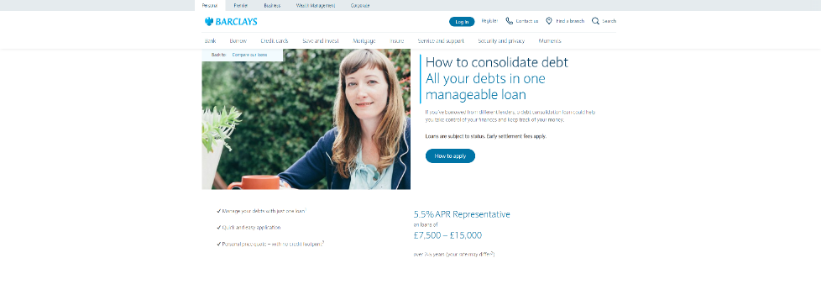Top 5 Best Credit Card Debt Consolidation Companies
Swiping a credit card is an extremely convenient way to pay for things, but it can be easy to let the charges rack up until you cannot afford to pay the whole amount at the end of the month. Although some people might be able to get by a few months making only minimum payments without sinking deep into debt, but that’s a slippery slope to start going down.
Many people today live with thousands of dollars in credit card debt, making just the minimum payments each month and letting the interest on these debts grow higher and higher. If you find yourself deep in credit card debt, you might be looking for a solution that will help you consolidate these debts.
The Need for Consolidation of Credit Card Debt
Paying just the minimum balance on your credit card debts only works for so long. Eventually you will have a big expense that you will need to pay for with credit, but your credit card will already be maxed out. That means you’ll have to get another credit card. And soon that one will be maxed out too. This downward spiral can be difficult to stop without consolidation of credit card debt. Consolidating a credit card means that you’ll replace all of your debts with just one loan, called a consolidation loan, that you will make regular payments on. These monthly payments will be lower than the payments required by your credit card debts to help you pay off your debt.
When you have a smaller monthly payment, you won’t feel so overwhelmed by your debts and you will be able to make regular payments instead of just paying the minimum required payment on your credit cards during tighter months.
The Two Methods for Consolidation of Credit Card Debt
When you are looking at consolidating your credit card debt, you have two choices to pick from: an unsecured loan and a secured loan. A secured credit card debt loan uses an asset, like your home, as collateral to protect against your defaulting on the loan. Since this loan has collateral, you can usually get a much lower monthly payment than if you were paying off each of your debts individually. Secured loans also have lower interest rates than unsecured loans.
An unsecured consolidation of credit card debt loan is easier to get than a secured loan, because it does not require an asset as collateral. However, this means that you may not be able to get a large enough loan to cover your current credit card debt. When companies have nothing to act as collateral, they are going to be more careful with the money they loan out. Because these loans do not have collateral, they are also considered higher risk, so you will most likely be charged a higher interest rate.
Applying for Consolidation of Credit Card Debt
If you are over your head in debt, you are probably wondering how you will ever work your way out by yourself. If you are overwhelmed by the monthly payments on your credit cards, don’t be discouraged, because you can consolidate these debts. The consolidation of credit card debt is probably the best choice for you. Not only will it lower your monthly payments and reduce your many debts down to just one manageable loan, but it will also simplify your life. Instead of worrying about all the debts that you have to pay each month, you can focus on replacing your bad money habits with good money habits while paying off your credit card debt in one easy monthly payment.
Read More: Top 4 Best Debt Relief Companies
How Credit Card Consolidation Can Help You Become Debt Free
Credit card consolidation is the technique of restricting your credit cards to only one credit card. This is performed by discontinuing the credit cards and shifting the balances to another card. Credit counseling agencies and debt consolidation companies frequently advise it to people as a means of managing credit card debts effectively. You can perform credit card consolidation single-handedly if you experience that you have become overextended with your credit card bills and you wish to make things easier. Credit card consolidation is a simple procedure and you just have to sit down and devise a suitable strategy for combating your credit card debts.
First of all, you need to consider a number of elements. This would incorporate your present budget and what you’re spending on your credit cards per month. You also have to take into account the interest rates. There would be different rates and some of them might be quite exorbitant if you’re in debt and could not get even with your bill payments recently. This is acceptable and debt consolidation plays an important role over here, assisting you to stay even with your bill payments.
Subsequently, you would have to think about your options. You don’t wish to eliminate the high interest credit cards at all times since older credit provides you some benefits. Nevertheless, you have to bargain with your credit card company in this regard. You have to take into account the suitability of your options and which interest rate suits you the most. Consolidating your credit cards is about limiting your cards to one credit card and subsequently, shifting balances to that card and paying them off.
Hence, this is the strategy. You take a note of the one credit card that you want to maintain. Continue with your previous credit card company that is ready to reduce the interest rate on your card. Shift all your debts to this card if you can. Soon you would notice that carrying out credit card consolidation on your own has helped you save a lot of money.
Top 5 Best Credit Card Debt Consolidation Companies:
SOFI
SoFi is a modern finance company. We partner with members to offer great service and low rates for student loan refinancing, mortgages and personal loans.

SOFI
NATIONALDEBTRELIEF
National Debt Relief is a BBB A+ accredited business that helps consumers get out of debt without loans or bankruptcy. Lower your credit card debt payments with a top rated debt consolidation company with over 25,000 client reviews.

NATIONALDEBTRELIEF
AVANT
Change the way you borrow with personal loans through Avant. Checking loan options is quick, easy, and does not affect your credit score.

AVANT
WELLSFARGO
Wells Fargo: Provider of banking, mortgage, investing, credit card, and personal, small business, and commercial financial services.

WELLSFARGO
BARCLAYS
Barclays debt consolidation loan could help you manage your debts with a single loan. Take control of your finances now.

BARCLAYS
Struggling With Credit Card Debt?
Seeing people buying food or shopping for clothes using credit cards is commonplace these days. The phrase “Charge it!” has become a favorite expression of card users, and is commonly heard in shops, dining places, and just about everywhere else.
After all, who does not want to use these credit cards? Easy to use, these sleekly-designed cards can be used to buy practically everything in commercial establishments regardless of how much (or little) money one carries money in their wallet. Short of cash and hungry? No grocery supplies? Going to a party but no money to buy that dress you’ve been drooling for? No problem! Your good ol’ credit can take care of that for you. No worries.
Credit Cards: Not Free Money
But wait. A credit card spree may be fun, but that doesn’t free you from responsibilities in paying the expenses you incurred from using your credit card. Credit cards, after all, are interest loans in disguise. Typical credit cards ask for a number of charges, including:
- A finance charge, which is an interest charge for the unpaid portion of your monthly bill;
- An annual membership fee;
- Or if you’re paying after the deadline, there is also a late payment fee that could have a higher interest rate.
In fact, many credit-card holders face credit-related problems. Poor purchasing decisions, lack of information on credit card fees, and disregard for upcoming credit payments are among the reasons why many credit-card users are often hard-pressed in paying their debts. Some are not even able to pay for the actual purchases they made, just barely managing to pay credit card company charges.
Before you get drowned in a sea of debt, here are some tips to help you manage your credit related expenses:
1. Be credit smart. Applying for a credit card application means you are ready to assume the responsibility for paying your credit. You and only you – not your parents, spouse, or whoever – is responsible for that.
2. Use your credit cards wisely and sparingly. Remember: Paying goods and services using credit cards are more expensive than using cash or checks. Credit payments include interest and other fees. Use credit cards as sparingly as possible. If you really need to use credit cards, carry only the cards that you will actually use.
3. Use credit only if you are sure you can repay it. Paying your debt on a credit card using another does not count.
4. Avoid impulse shopping on your credit card.
5. Use credit for money emergency only.
6. Seek credit counseling as soon you see financial problems on the horizon.
6 Facts about Credit Rating
More and more people have become increasingly dependent on their credit. Whether you need it for a loan or mortgage or for purchasing clothes and other services, there’s no arguing the fact that credit occupies a big part of our lives.
This is all the more reason for you to understand credit reports, credit ratings, and scores. Here you will learn the six important facts about credit rating and some tips to help you get that loan you’re applying for, improve your credit history, and other helpful hints for a better credit profile.
FACT #1: Creditors Rely on Credit Rating to Determine Credit Approval
Using credit is really just borrowing money that you promise to pay back within a specified period of time. Now, at the onset, you can see how important it is for the creditor that you are really going to pay back what you owe him.
But the problem is that there is generally no guaranty that the debtor – you – will pay back what you owe. At least, not to the creditor, there isn’t, unless, of course, you added a mortgage to your loan to guaranty the credit. And even if there is such a guaranty, it would still be better for everyone involved if the debtor is able to pay his obligations on time.
This is why creditors are often very strict when screening loan applications. They want to find out whether the person is going to be a good investment by making his payments on time.
Now, one effective way for creditors to determine the likelihood of a person paying back the money he or she has borrowed is through the credit rating system or your credit score. It is a statistical method that is based on various factors that relate to income, employment, credit balance, payment habits, among others.
There are three main credit bureaus that issue credit scores, namely Equifax, TransUnion, and Experian. But don’t expect that these agencies will give you consistent scores. Since each credit bureau uses different evaluation systems, each based on different factors, it is highly likely that your credit score issued by one bureau is different from those issued by the other two.
In addition, some lenders formulate their own evaluation procedures to calculate a person’s credit score. They may also contact an independent credit reporting agency to issue credit scores that use evaluation systems different from those used by the credit bureaus.
There is no sure way to determine what factors a credit bureau is using to calculate your credit score. However, there are a few that remain more or less constant.
When calculating your credit scores, the following factors are often taken into consideration:
- Debt and payment history on credits, such as credit cards, student loans, consumer loans, car loans, among others
- Current debts
- Time length of credit history
- Credit type mix
- Frequency of applications for new credit or inquiries for new credit • And other factors that may be taken into account, such as tax liens, judgments, and bankruptcies All these factors can be determined from your credit report. A break down of all these factors shows that your credit rating is most affected by your propensity for paying off your debt as shown by your credit history or previous credit performance. If your credit rating shows that you pay off your debts fairly quickly in the past, then your present credit rating could get a boost up from that. Additionally, maintaining low levels of indebtedness, refraining from constantly applying for additional credit, and having a long credit history will help your credit rating in the long run.
FACT #2: Factors Considered in Calculating Credit Scores
When you borrow credit, the lender will want to find out how likely you are going to repay what you owe. Hence, they contact any of the three national credit bureaus to get a copy of your credit score. The credit score predicts, based on your past behavior, what kind of a borrower you are – whether you are the sort who makes repayments regularly or one who regularly misses following up on your obligations. Typically, lenders will use your credit score to help them determine the following:
- What loan types you are eligible for
- Whether to approve your loan or not
- What your interest rate will be The law does not mandate specific factors to consider in credit scoring systems. Therefore, credit reporting agencies are more or less free to consider whatever factors they may feel is important to determine how willing you are to pay your bills. But while the law does not specify what factors to consider, it is however very specific about what may not be considered in a credit score. Credit reporting agencies, credit bureaus, and lenders are prohibited from considering the following factors in credit scoring systems:
- Race
- Religion
- Gender
- Marital status
- Nationality
- Age
- Receipt of public assistance
If there is one thing you need to remember about credit scores is that they reflect credit behavior patterns. This means that no one factor will be considered as the only cause of a “risky” score.
So even if you have a previous collection or a bankruptcy, there is a chance your credit score could still be around the neighborhood of “average,” which is actually good and entitles you to generally low interest rates.
As your credit behavior improves, so does your credit score. There is no quick fix to improving your credit score. Any short term improvements will not cause a risky score to improve dramatically. So instead of relying on quick fixes and instant solutions to poor credit scores, change your credit behavior by paying your bills regularly and on time and refraining from opening any new credit accounts.
FACT #3: Credit Rating is Indicative of Credit Behavior
Every time you apply for new credit, your credit rating gets checked. As mentioned earlier, lenders want to know how good a risk you are going to be when they do decide to lend you the money needed.
Any sort of credit application requires a credit rating check – credit cards, mortgages, or even a phone hookup. The financial theory is that increased credit risk means that a risk premium must be added to the price at which money is borrowed.
In simpler terms, this means that if you have poor credit rating, lenders will not turn you down at the onset but will lend you money at a higher rate than the one paid by someone with a better credit score. Higher rate, of course, is not a desirable outcome since how high an interest you pay determines how soon you can pay off the entire loan and how big a down payment you are required to pay.
Take the following scenario, for example:
A, with a credit score of 700 gets a rate of 5.61% on a loan. A pays $862 every month. B, on the other hand, has a credit score of somewhere around 560. The lender offered him a rate of 8.53% and he accepted, so that he is now paying $1,157 every month.
Do you see the difference? For the same loan amount, B ends up paying more every month than A does. This, of course, has a large impact on how much B is paying for the interest alone since the general rule is that payments will first apply to the interest before the principal, which is the actual loan amount borrowed.
FACT #4: Credit Scores Help Consumers
Since your credit rating or credit score is indicative of your credit behavior patterns, lenders typically use them to gauge the risk of having you as borrower. Just by studying your credit score, they will know right away how much they are willing to offer in terms of loan rates, interests, and monthly repayments. This actually helps speed up the approval process of a credit application.
Your credit score is not based on human judgment. It is not based on cultural or demographic differences among people. The guidelines used in determining your credit score apply to everyone else’s credit scores so that by using standard credits cores, lenders are able to treat each consumer objectively.
FACT #5: Your Credit Report is Key to Your Credit Rating
Your credit rating is a fragile thing. And since credit is very crucial these days, you really cannot afford any mistakes or errors that could negatively affect your credit rating, ergo, your chances of getting approved for additional credit.
To protect your credit from any damage, review your records at least once a year. The US Congress has recently amended the Fair Credit Reporting Act (FCRA) by including a provision that provides for the issuance of free credit reports to consumers from any of the three national credit bureaus – Experian, Trans Union, and Equifax.
You can get your copy of your free credit report by logging on to the AnnualCreditReport website and ordering a copy online. Alternatively, you can contact any of the numbers and email addresses provided in the Consumer Alert page of the Federal Trade Commission (FTC) website.
The free credit report may come from any or all three of the national credit bureaus. However, if you order directly with these bureaus, they may charge you a small fee. So to ensure that your free credit report remains free of charge, order yours from the website given.
Review your credit report and check for any errors. If you find any, contact the credit bureau that compiled the report. Under the law, the bureau is required to investigate your disputed items within 30 days, at no cost to you. After investigation, the credit bureau is further required to provide you with written notice of the results of the investigation within five days, including a copy of your credit report if it has changed based upon the dispute.
FACT #6: Improving your Credit Score Improves Your Chances of Getting Approved
A high credit score means you are a “low risk” consumer. Lenders would be willing to offer you credit with low interest rates, monthly repayments, and down payments. Therefore, it is important that you improve your credit score or at least maintain it if you already have good credit rating.
Here are some tips to help you build your credit score:
- Make loan payments on time and for the correct amount.
- Avoid overextending your credit.
- Never ignore overdue bills.
- Be aware of what type of credit you have.
- Keep your outstanding debt as low as you can.
- Limit your number of credit applications
- A longer history of good credit is favored over a shorter period of good history.
Credit is very crucial to our every day lives. How you manage your credit affects your overall financial health. The facts and tips we have provided you will help you to either maintain or improve your credit score.
Tips to maintain a good credit score
It requires time to build a good credit score. Your credit score depends on various factors such as when you pay your outstanding bills, how you use your credit, and how often you apply for a new credit card. Your credit score also determines several things such as whether or not you are eligible to take out a home or car loan, apply for a credit card and other financial assistance. In case you have poor credit rating, you may be declined for loan approval or get hold of credit card for a specific time period. So, it is better to pay down your credit card debts. You need to know how to consolidate credit card debt if you find difficulty to repay them. While planning to take up a financial decision and need to boost your credit score, here are 5 tips that may help you improve credit score soon.
Pay off the outstanding bills on time – Your payment history on the credit reports shows whether or not you pay the bills before the due date and any delinquencies when you’re late. Formulate a suitable budget to make sure that you have enough money to make at least the minimum payment on all your accounts. You may start electronic payments, if possible, so the money may always reach on or before the due date.
Eliminate credit card debts – The debt burden is an important factor in your FICO score and it makes up 30 percent of the score. The lenders would like to see that you use credit but they will not open new accounts if you have too much debt to repay to the existing creditors. Your balances will not decrease much if you make only the minimum payment. Reduce the optional purchases that you make and use the money to pay off the high interest accounts.
Keep track of the old accounts – You should keep track of your old credit card accounts and see if they are in good standing. Fifteen percent of your credit score shows how long you’ve used credit. Closing your old accounts may hurt your credit score. As such, you can leave them open and use them occasionally so that the bank does not cancel them for being inactive. The law prohibits the card issuers to charge the inactivity fees but they can close accounts that are not used anymore.
Check your credit report – In order to rebuild a good credit score, you will have to obtain a copy of your credit report. You can get your credit score from the three credit reporting bureaus – Experian, Transunion and Equifax free of cost once every 12 months. You may also request for your credit report from a website called annualcreditreport. This is the only authorized online source to obtain your free credit reports. Check your credit report very carefully and see if there are any errors. If you find your present account has been marked as delinquent or charged that you’re not familiar with, contact the companies listed and rectify your credit report.
Maintain correct credit reports – You should maintain correct information on your credit reports. However, if there is any incorrect information on your credit report, it will leave a negative mark on it. According to the Federal Trade Commission (FTC), you can dispute mistakes lawfully which compels the three credit bureaus to authenticate the data. You may obtain credit reports free of cost from Annualcreditreport and assess them in order to check the accuracy. Report the mistakes if there are any, through the online dispute forms on the website if the credit bureau. Your credit score gets a boost once the bureau fixes or removes the incorrect, negative entries.
The above tips will help you improve your credit score with time so that you can become credit worthy.